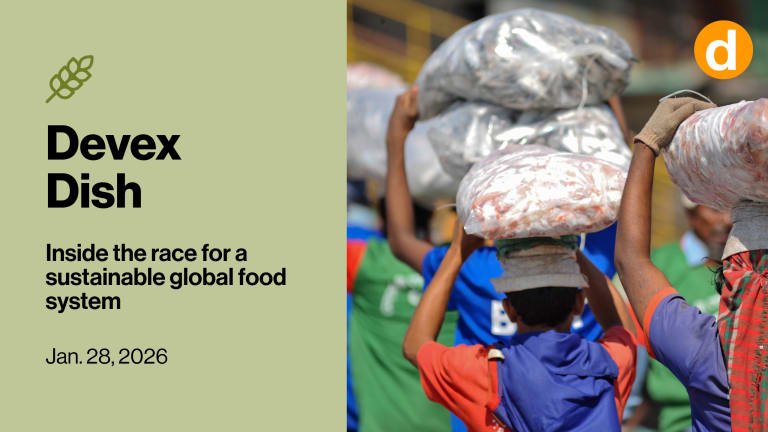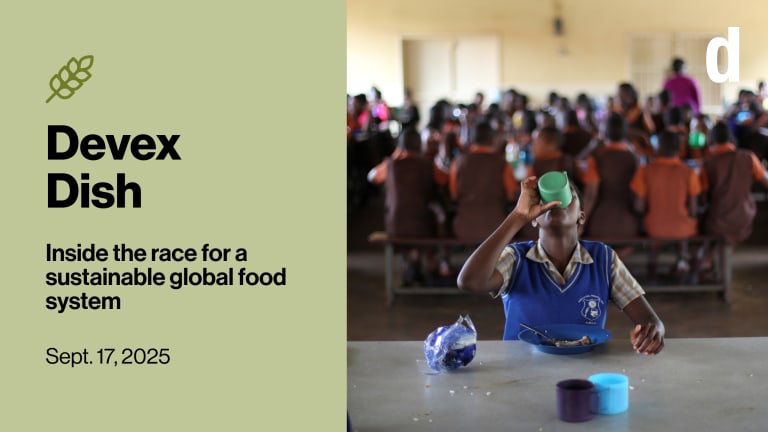Devex Dish: A grim new forecast on the state of the world’s food crises

The 2022 Global Report on Food Crises — released today — paints a grim picture of deteriorating food crises that are expected to be compounded by the war in Ukraine.
According to the report, which was compiled by the Global Network Against Food Crises — an international alliance which includes the EU, FAO, and WFP — levels of hunger surpassed all previous records in 2021, with close to 193 million people acutely food insecure and in need of urgent assistance across 53 countries and territories. This represents an increase of nearly 40 million people compared to 2020.
This is a preview of Devex Dish
Sign up to this newsletter to get the inside track on how agriculture, nutrition, sustainability, and more are intersecting to remake the global food system in this weekly newsletter.
In addition, over half a million people — four times more than in 2020 — were facing what’s classified as IPC Phase 5/Catastrophe, or to put it more bluntly, starvation and death, across Ethiopia, South Sudan, southern Madagascar, and Yemen.
And it’s not going to get better anytime soon. The report found that the outlook for global acute food insecurity is expected to deteriorate further due to the war in Ukraine and its repercussions on global food, energy, and fertilizer prices and supplies. Though the effects of the conflict have not yet been factored into the country projections included in the report, as many as 181 million people are already forecast to be in crisis or worse in 41 out of the 53 countries and territories surveyed.
“What we are seeing is a perfect storm around the world,” David Beasley, WFP’s executive director, says. “If we don't get ahead of this thing, we will have not just famine in multiple countries around the world … but you will have destabilization of some nations and you will have mass migration by necessity — and no one wants that.”
We will be publishing more details from the report — as well as recommendations from its official launch — later today.
ICYMI: Teresa reported on how global food insecurity will only rise further if land degradation isn't immediately addressed.
Feed the world
Last week the U.S. House of Representatives passed the Global Malnutrition Prevention and Treatment Act, a bill that would authorize USAID to increase targeted interventions to prevent and treat malnutrition, with a focus on multisectoral nutrition programs. It also includes provisions for monitoring to ensure effective use of taxpayer dollars.
“Support for these low-cost and effective interventions means an investment in the health, development, and productivity of the next generation of children around the world,” Rep. Michael McCaul — a Republican from Texas and one of the bill’s sponsors in the House — said in a statement. A companion bill is under consideration in the Senate.
+ Check out our page dedicated to the future of U.S. aid.
Number munching
229 million
—That’s the number of people reached by infant formula companies’ daily social media posts, according to a new report from the World Health Organization. In its second report from a series about the industry, WHO finds that formula companies pay for access to parents and pregnant people, targeting them “with personalized social media content that is often not recognizable as advertising.”
WHO recommends exclusive breastfeeding for the first six months of life and wants the baby food industry to end “exploitative formula milk marketing.”
ICYMI: WHO sounds alarm on 'unethical,' 'aggressive' formula milk marketing
+ Get exclusive global health news and insider insights by signing up for Devex CheckUp — our free, must-read Thursday newsletter.
Out of reach
Kenya’s status as a lower-middle-income country has restricted international donor funds for nutrition, including treatment for severe acute malnutrition in the form of ready-to-use therapeutic foods, or RUTFs.
As part of the International Center for Journalists’ Global Nutrition and Food Security Reporting Fellowship, Teresa worked with journalists Leon Lidigu and Justine Muboka on a monthslong investigative piece examining the malnutrition crisis in Kenya — where 3.5 million people are expected to be food-insecure by next month if the rainy season is lackluster — and how RUTFs are not reaching those who need them.
The piece, published by Africa’s Nation media outlet, is a deep dive into all the complicating factors restricting access to malnutrition treatment in Kenya amid one of the worst droughts in decades. Our reporting found that RUTFs are often sold on the street as snacks, with people in refugee camps selling theirs off to traders who then peddle them to non-malnourished people who have developed a taste for them.
Fishing lines
“Technology is a key part of the jigsaw, but really it’s just a part. It has to be integrated with a lot of other considerations.”
— Peter Horn, project director for the international fisheries program, The Pew Charitable TrustsLaunched in 2016, Global Fishing Watch aimed to drive transparency and accountability in the notoriously opaque fisheries sector by providing location data from boats and ships. But six years on, the platform has seen mixed results, and it’s unclear if illegal, unreported, and unregulated fishing is any less of a problem.
Read: Did Global Fishing Watch achieve its goal of transparency? (Pro)
+ A Devex Pro subscription brings you essential analysis, data-driven funding insights, and access to the world’s largest global development job board. Get these perks and more by signing up to our 15-day free trial.
Chew on this
It’s nearly impossible to twist an Oreo and be left with equal amounts of filling on each cookie, a scientific study finds. [Physics of Fluids]
“Policymakers should as much as possible use direct transfers to protect the most vulnerable households” in Africa against food and fuel price shocks. [IMFBlog]
Financing remains a constraint to providing free school meals to all children, despite evidence that they improve nutritional and educational outcomes. [Center for Global Development]
Heifer International is investing $1 million in pay-as-you-go financing for tractors on booking platform Hello Tractor. [Heifer International]

Search for articles
Most Read
- 1
- 2
- 3
- 4
- 5









